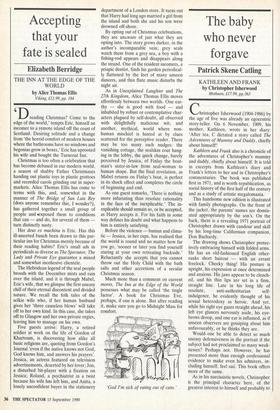The baby who never forgave
Patrick Skene Catling
KATHLEEN AND FRANK by Christopher Isherwood
Methuen, £17.99, pp.363
Christopher Isherwood (1904-1986) by the age of five was already an egocentric story-teller. On 6 November, 1909, his mother, Kathleen, wrote in her diary: 'After tea, C dictated a story called The Adventures of Mummy and Daddy, chiefly about himself!'
Kathleen and Frank also is a chronicle of the adventures of Christopher's mummy and daddy, chiefly about himself. It is told in excerpts from Kathleen's diary and Frank's letters to her and in Christopher's commentaries. The book was published first in 1971, and is worth republication, as social history of the first half of the century and as a study of artistic megalomania.
This handsome new edition is illustrated with family photographs. On the front of the jacket, the parents' names are domin- ated appropriately by the son's. On the back, there is a revealing 1971 portrait of Christopher drawn with candour and skill by his long-time Californian companion, Don Bachardy.
The drawing shows Christopher protec- tively embracing himself with folded arms. He has an old-fashioned English other- ranks short haircut — with an errant forelock. Cheeky thing! His posture is upright, his expression at once determined and anxious. His jaws appear to be clench- ed, and his thin lips are set in a firm, straight line. Late in his long life of resolute, anti-authoritarian self- indulgence, he evidently thought of his sexual heterodoxy as heroic. And yet, while his right eye gazes straight ahead, his left eye glances nervously aside, his eye- brows droop, and one ear is inflamed, as if unseen observers are gossiping about him unfavourably, or he thinks they are.
Would. one be able to detect so much uneasy defensiveness in the portrait if the subject had not proclaimed so many weak- nesses? Perhaps not. However, he has presented more than enough confessional evidence to make even his admirers, in- cluding himself, feel sad. This book offers more of the same.
As in his narcissistic novels, Christopher is the principal charactef here, of the greatest interest to himself and probably to his readers. As in the novels, the fact that he writes about himself in the third person does not separate him from himself nor diminish the impression of hypnotic self- regard. The simulacrum of objectivity is illusory; the world is his ego. And, as in the novels, Christopher writes about Christ- opher with fine, clear, cool precision.
Kathleen and Frank met in 1895 and married in 1903, in spite of her father's implacable hostility to the match. A dutiful though reluctant professional soldier who wished he could be a full-time painter, Frank served in the Boer War until he was ill. He was killed on the Western Front in 1915. (His death was not witnessed, his body was not found. Maybe he did a Gauguin, a possibility that Christopher never considered.) During the long separa- tions, Frank wrote many letters, and Kath- leen's diary continued in widowhood. They both wrote interestingly, and Christopher was a good editor.
Christopher's mother was emotionally exploited by her own mother, whom Christopher describes, with waspish wit, as 'a great psychosomatic virtuoso.' She was loth to release her daughter-nurse to mar- riage.
Christopher decided at an early age that he would not allow his parents to possess him. He was determined to be free from all Establishment conventions and institu- tions, such as the Anglican Church and social class, though even in exile he ranked himself with nice accuracy in the upper middle. This book shows that he was proud of the big houses his family formerly owned. He was a bit of a snob, even if he perversely boasted of descent from the judge who condemned King Charles I, because Judge Bradshaw was later vilified and so could be revered as an 'Anti- Ancestor.'
Christopher wrote that he
revolted early and passionately against the cult of the Past. As an adolescent orphan he was subjected to reminders by schoolmasters and other busybodies of his obligations to the memory of Frank, his Hero-Father. So he learnt to hate and fear the Past because it threatened to swallow his future.
He develops this theme in an Afterword, which seems to be a masochistic plea for his readers' disapproval. 'A Hero-Father leaves behind him a Holy Widow-Mother, who shames her children by her sacred grief,' he writes, proudly asserting that he was a shameless `Anti-Son.'
Even after Christopher escaped from bourgeois respectability to the working- class homosexual bars of Berlin, Kathleen maintained a record of his achievements, which she called `The Baby's Progress.' The last entry was written on 5 January, 1928: 'Christopher's first novel accepted by Jonathan Cape.' From then on, he was really on his own.
While Christopher was still in his cradle, Frank presciently wrote that he wondered whether his son would one day —find his 'How would you like your lamb,
parents out and never forgive them," as Oscar Wilde says. I think very few people do ever really forgive their parents!'
Kathleen and Frank is a work of discov- ery and non-forgiveness which proves that daddy's foreboding was justified.



























































 Previous page
Previous page